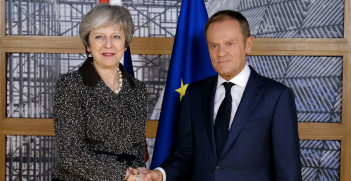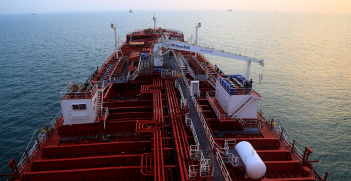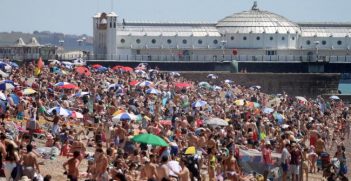Brexit: What Now?

Despite having formally left the EU, the UK is still subject to European law until 31 December 2020. What plans does Johnson have for this transition period?
The celebrations were short, Big Ben remained silent, consumption of alcohol and the playing of music in the area around Westminster’s Parliament Square were banned. The Johnson government has banished the word “Brexit” from the Whitehall Lexicon, but they could not ban the leader of the Brexit party from enjoying his last, gloating hurrah. Nigel Farage told his adoring followers, clad in red, white and blue, to enjoy “the greatest single moment in modern British history.” After 47 years, Britain had left the European Union.
Inside 10 Downing Street a few blocks away, prime minister Boris Johnson and his ministers, who had travelled almost 1000 kilometres (almost the length of England and back) to hold a symbolic cabinet meeting in the northern city of Sunderland, had a late dinner devoid of anything continental. The menu included Shropshire blue cheese, British roast beef, and Yorkshire pudding, washed down with English sparkling wine.
By Monday, reality had dawned. The Union Jack had been lowered in Brussels; there were no longer any British members of the European Parliament or British ministers on the governing European Council; and Britain for the first time in nearly 50 years had no say in the governance of Europe.
But until 31 December 2020, the United Kingdom is still subject to European law and the decisions of the European Court of Justice, still has to pay its dues to the European Commission, and will continue to obey the regulations and trade practices of the European Union. On that date, the 11-month interim agreement between London and Brussels is due to end. Until then, immigration, travel throughout the 27 member countries, reciprocal health arrangements, and trade in goods and services within the European single market remain unchanged.
So the post-Brexit new “golden” global Britain, along with trade deals with countries like Australia, China, Japan, ASEAN, and the United States, remain a mirage for now. Multiple tricky and difficult negotiations on post-2021 trade are likely to dominate the months ahead.
Next month Britain will start twin-track negotiations with its two most important trading partners, the European Union and the United States. Before then Johnson will reshape his cabinet, with one-time rival Michael Gove likely to be handed the job of managing negotiations. Chancellor Sajid Javid and foreign secretary Dominic Raab have also been tipped for the job.
Johnson set the tone for both sets of talks in a comprehensive and well delivered speech to a business audience on 3 February. What may have surprised many listeners was the enthusiasm with which he invoked the spirit of Adam Smith – to the point where he sounded like an evangelist. He embraced free trade, in particular with the Commonwealth of Nations, as the heart of Britain’s future strategy. “We are re-emerging after decades of hibernation as a campaigner for global free trade,” he said.
“Free trade is being choked and that is no fault of the people, that’s no fault of individual consumers. I am afraid it is the politicians who are failing to lead. The mercantilists are everywhere, the protectionists are gaining ground.”
“From Brussels to China to Washington tariffs are being waved around like cudgels even in debates on foreign policy where frankly they have no place – and there is an ever-growing proliferation of non-tariff barriers and the resulting tensions are letting the air out of the tyres of the world economy. World trading volumes are lagging behind global growth. Trade used to grow at roughly double global GDP – from 1987 to 2007. Now it barely keeps pace and global growth is itself anaemic and the decline in global poverty is beginning to slow.”
“And in that context, we are starting to hear some bizarre autarkic rhetoric, when barriers are going up, and when there is a risk that new diseases such as coronavirus will trigger a panic and a desire for market segregation that go beyond what is medically rational to the point of doing real and unnecessary economic damage, then at that moment humanity needs some government somewhere that is willing at least to make the case powerfully for freedom of exchange, some country ready to take off its Clark Kent spectacles and leap into the phone booth and emerge with its cloak flowing as the supercharged champion, of the right of the populations of the earth to buy and sell freely among each other.”
This long but fascinating preamble was a precursor to some tough talk, with Johnson setting red lines against any attempt by the European Union to impose adherence to its regulations as a precondition for agreeing tariff free trade with the bloc.
The EU’s chief negotiator, Michel Barnier, had set out this conditionality in an earlier news conference, when he issued a pointed reminder to Johnson that, in the political declaration he had signed as part of the withdrawal agreement negotiated last year, he had already agreed to stay true to EU rules on standards and subsidies. While saying the EU would offer Britain a free trade deal, he added a level playing field had to be a condition for a “zero-tariffs, zero-quota” deal. “We are in favour of free trade but we are not going to be naive,” he said.
Johnson would have none of it. “We will not engage in some cut-throat race to the bottom”, he said. “We are not leaving the EU to undermine European standards, we will not engage in any kind of dumping whether commercial, or social, or environmental, and don’t just listen to what I say or what we say, look at what we do”.
He pointed out that France spends twice as much on state aid as the UK and three times as much as Germany, and the latter is using subsidies to undercut competitors.
Listing numerous examples, he said Britain had more generous benefits and allowances than the EU, arguing he did not expect Brussels to adopt British practices, and was not prepared to accept, holus bolus, the EU’s.
The prime minister also made it clear that the United States had restrictions he expected to be swept away before agreeing to a trade deal with Washington, singling out a variety of limiting regulations and reiterating that Britain would not allow the National Health Service to be the subject of trade talks, despite president Trump’s insistence. Nor would he accept China’s refusal to buy Welsh lamb when it was already buying it from New Zealand. Of Australia, he said, “I have had a text from ScoMo saying he was keen to negotiate,” but it was likely the EU and the US would be priorities.
So the stage is set for another series of clashes between London and Brussels, which may extend well into the second half of the year, with unpredictable outcomes. There will be a big row on fishing rights, with the EU demanding continued access to British waters in exchange for allowing UK banks to operate on the continent. If negotiations fail, we will be back to a no-deal Brexit, now euphemistically referred to as an Australia-type deal, similar to that which Canberra currently has with Brussels. For both the UK and the EU, business does not welcome this.
Australians may well be bemused by Johnson’s repeated reference to an “Australian style deal” as an acceptable alternative to a new trade agreement with the European Union. What deal is that, you may ask? Of course, it does not exist. It is simply Johnson’s disingenuous attempt to disguise the fact that it would reintroduce a “no-deal Brexit” that, by the government’s own admission, will, if it happens, cause heavy damage to the economy.
There has been a very mixed reaction to Johnson’s latest tack. Some see his going back on his solemn pledges in the agreement he signed only three months ago as only a negotiating ploy, others detect a desire to placate his friend in the White House, while press commentators see the prime minister’s tactics as setting up the EU as the villains in the coming trade talks.
The Guardian’s veteran political columnist Polly Toynbee summed it up neatly: “It sounds like war. The thud of the falling pound greeted the prime minister’s tub-thumping speech: it suggested his “great voyage” was destined for the rocks of the hardest of Brexits. Days after proclaiming we would leave with peace, prosperity and friendship, he set out to do battle with those he called our friends and neighbours. Now our ersatz Winston Churchill proclaims he will fight them on our fisheries, fight them on aviation, but above all fight off their filthy regulations.”
Colin Chapman FAIIA is a writer, broadcaster and public speaker, who specialises in geopolitics, international economics, and global media issues. He is a former president of AIIA NSW and was appointed a fellow of the AIIA in 2017.
This article is published under a Creative Commons Licence and may be republished with attribution.





